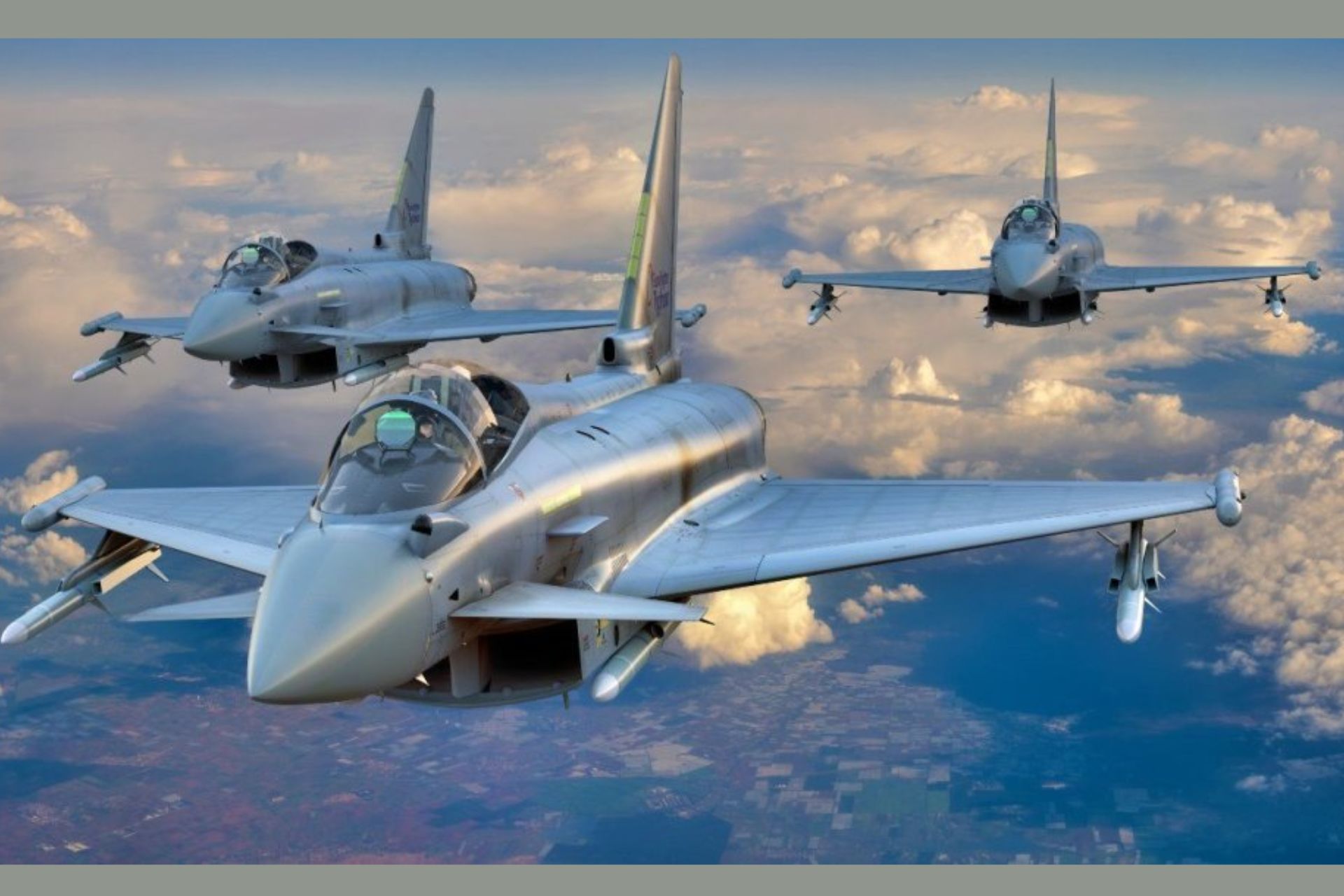German airbus linked company wants to use Typhoon and UAV mixed squadron


{loadposition bannertop}
Breaking news
{loadposition sidebarpub}
According to the Military Programming Law (LPM) for 2024-30, the Rafale upgraded to the F5 standard will need to be capable of operating alongside loyal wingman-type drones developed from the nEUROn demonstrator. This will mark a step towards the Future Air Combat System (SCAF), a program conducted in cooperation with Germany and Spain, based on a next-generation fighter aircraft developed under the leadership of Dassault Aviation, with the German and Spanish subsidiaries of Airbus Defence & Space as partners
Follow Army Recognition on Google News at this link
/* 468×15 data sheet menu top dark green */
google_ad_slot = “3500417247”;
google_ad_width = 468;
google_ad_height = 15;
// ]]>
/* top_468x60_fiche_technique */
google_ad_slot = “2746785843”;
google_ad_width = 468;
google_ad_height = 60;
// ]]>
View of EF2000/Typhoon, patrol configuration (Picture source: Open source)
However, the Rafale F5 will likely not be the only European aircraft able to control drones. Indeed, as part of the Long Term Evolution (LTE) project launched in 2019, the German branch of Airbus Defence & Space intends to develop capabilities known as Manned UnManned Teaming (MUM-T) for the Eurofighter EF-2000/Typhoon.
Details about this program, called STAR (System and Teaming Advanced Research) and conducted within the X-Platform (XPCS) study, were provided in a job posting by the industrial firm, which was in search of a chief engineer to lead it at Manching, Germany.
It involves developing a “STAR demonstrator,” based on a two-seater EF-2000/Typhoon, notably featuring “new connectivity” to explore technologies related to human-machine interfaces (HMI), which will then be used in future applications of SCAF.
However, these efforts will also aim to ensure that the Eurofighter remains an “active future” component of SCAF, with developments from the STAR project being “compatible and complementary” to the LTE program involving not only Germany and Spain but also the United Kingdom and Italy, the latter two countries being involved in the Global Combat Air Programme (GCAP).
LTE will bridge towards the respective future air combat systems (SCAF and GCAP) as specified by the Eurofighter consortium, formed by BAE Systems, Airbus, and Leonardo. The consortium also noted that some of the technologies currently under study are very immature, but they need to be examined because there is a desire to sustain the Typhoon as much as possible.
Nevertheless, Airbus is not starting from scratch. In December 2022, the company celebrated the successful demonstration of the “Multi-Domain Flight Demo” (MDFD), which enabled two fighter jets, a helicopter, and five support drones to conduct a “multi-domain mission very close to a real-life situation” via a meshed airborne data link network.

{loadposition bannertop}
Breaking news
{loadposition sidebarpub}
According to the Military Programming Law (LPM) for 2024-30, the Rafale upgraded to the F5 standard will need to be capable of operating alongside loyal wingman-type drones developed from the nEUROn demonstrator. This will mark a step towards the Future Air Combat System (SCAF), a program conducted in cooperation with Germany and Spain, based on a next-generation fighter aircraft developed under the leadership of Dassault Aviation, with the German and Spanish subsidiaries of Airbus Defence & Space as partners
Follow Army Recognition on Google News at this link
/* 468×15 data sheet menu top dark green */
google_ad_slot = “3500417247”;
google_ad_width = 468;
google_ad_height = 15;
// ]]>
/* top_468x60_fiche_technique */
google_ad_slot = “2746785843”;
google_ad_width = 468;
google_ad_height = 60;
// ]]>
View of EF2000/Typhoon, patrol configuration (Picture source: Open source)
However, the Rafale F5 will likely not be the only European aircraft able to control drones. Indeed, as part of the Long Term Evolution (LTE) project launched in 2019, the German branch of Airbus Defence & Space intends to develop capabilities known as Manned UnManned Teaming (MUM-T) for the Eurofighter EF-2000/Typhoon.
Details about this program, called STAR (System and Teaming Advanced Research) and conducted within the X-Platform (XPCS) study, were provided in a job posting by the industrial firm, which was in search of a chief engineer to lead it at Manching, Germany.
It involves developing a “STAR demonstrator,” based on a two-seater EF-2000/Typhoon, notably featuring “new connectivity” to explore technologies related to human-machine interfaces (HMI), which will then be used in future applications of SCAF.
However, these efforts will also aim to ensure that the Eurofighter remains an “active future” component of SCAF, with developments from the STAR project being “compatible and complementary” to the LTE program involving not only Germany and Spain but also the United Kingdom and Italy, the latter two countries being involved in the Global Combat Air Programme (GCAP).
LTE will bridge towards the respective future air combat systems (SCAF and GCAP) as specified by the Eurofighter consortium, formed by BAE Systems, Airbus, and Leonardo. The consortium also noted that some of the technologies currently under study are very immature, but they need to be examined because there is a desire to sustain the Typhoon as much as possible.
Nevertheless, Airbus is not starting from scratch. In December 2022, the company celebrated the successful demonstration of the “Multi-Domain Flight Demo” (MDFD), which enabled two fighter jets, a helicopter, and five support drones to conduct a “multi-domain mission very close to a real-life situation” via a meshed airborne data link network.






